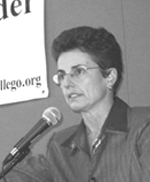Health commissioner faulted for moving away from community-based HIV leadership
AIDS groups are responding negatively to an editorial authored by Dr. Thomas R. Frieden, the city’s health commissioner, that argued for more efforts aimed at contacting and testing the sex partners of people infected with HIV as well as broader city oversight of the care for people with AIDS.
“Dr. Frieden has been a proponent of this approach since before he became commissioner,” said Jay Laudato, executive director of the Callen-Lorde Community Health Center, a gay health clinic. “I think he makes many cogent arguments, but he doesn’t lay out a very clear and implementable plan for dealing with an illness that is lifelong.”
The editorial, which ran in the December 1 issue of the New England Journal of Medicine, read, in part, that the “failure to apply standard disease-control methods undermines society’s ability and responsibility to control” the AIDS epidemic. One complaint about Frieden’s proposals is that he has not said exactly what he would like to do.
“He still hasn’t really spelled out what it’s all about,” said Charles King, president of Housing Works, an AIDS service organization. “I wish he would stop being coy about it and say what he is proposing to do.”
In a December 6 interview with Gay City News, Frieden said that his department had not set the specifics of the vision he articulated.
“How it works we haven’t worked out yet, but that it needs to happen is pretty clear,” he said. That vacuum has led to groups reacting to the broad outlines of Frieden’s ideas that, in some cases, are disturbing to them.
In the editorial, Frieden proposed what could be interpreted as a kind of ongoing partner notification effort that might require that people who are HIV-positive be asked regularly about their sex partners. Those partners could then be contacted and tested for HIV.
The editorial also noted that New York City “has no systematic citywide information available on whether patients have begun, are continuing, or have a virologic response to treatment,” a proposal that looked like widespread city monitoring of HIV care.
The perception that Frieden was proposing sweeping changes with implications for many people with AIDS and their healthcare providers was further cemented in a December 1 New York Times article in which he placed no limits on these efforts.
Speaking with Gay City News on December 6, however, Frieden said that any partner notification would be limited to city doctors asking patients about their sex partners, something that private doctors are required to do, and offering to provide partner notification help.
With roughly 95,000 people living with AIDS or HIV in New York City, Frieden told Gay City News that monitoring care would be limited.
“We’re not going to case manage 95,000 people,” he said. “That’s not the proposal, but maybe we should be better tracking some portion of them.”
For AIDS groups, the scope of the proposals, how they would be done, and who would be impacted is unclear.
“It’s hard to understand how we would be able to develop the sort of tracking mechanisms and case management mechanisms and partner notification mechanisms that he talks about without exceptional sums of money and considerable loss of the privacy and potentially the rights of individuals with HIV,” Laudato said.
Weighing Frieden’s comments to Gay City News and the editorial, Ana Oliveira, executive director at the Gay Men’s Health Crisis, or GMHC, an AIDS group, said they suggested a “dual-system approach” with one “for those who have private care” and another for those “who have public care.” Those New Yorkers receiving public care tend to be poorer.
But when he spoke with Gay City News, Frieden said that people in some poorer communities were more receptive to his ideas.
“When I go to Harlem and Bed Stuy and the South Bronx, I don’t hear how dare you do that, I hear how can you not do that,” he said.
Generally, the AIDS groups also objected to what they saw as the medicalization of functions, such as keeping people on anti-HIV drugs or teaching them about those drugs. Those jobs are often performed by community groups.
“That’s actually a concern for many of us who do adherence support and treatment information,” said Dennis deLeon, president of the Latino Commission on AIDS. “I don’t think we should be moving away from that… Community-based organizations are the best way to do HIV prevention and even adherence support and treatment. Doctors and people in clinics don’t have the time or even the experience to deal people in these communities.”
GMHC’s Oliveira said that there are many “psychosocial issues,” such as “homophobia,” the “inequities produced by racism or healthcare access,” that put people at risk of HIV infection or missing drug doses and these issues cannot be addressed in a doctor’s visit.
“We also believe that HIV and AIDS in New York are primarily… supported, enabled by many psychosocial issues that a traditional medical model does not address,” she said. “We think that the medical model is necessary, but not sufficient.”
gaycitynews.com


































